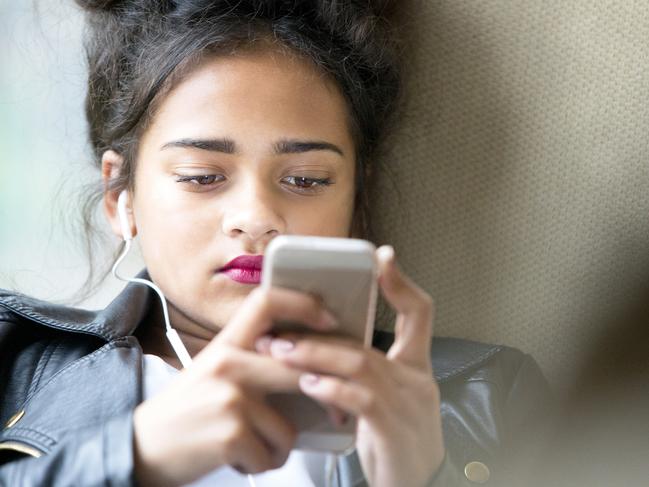Internet addiction affects mental health of teens, leading to problems in adulthood
New Australian research has shown the shocking lifelong effects of internet addiction on teenagers as they grow into adulthood. SEE HOW YOU CAN PROTECT YOUR CHILD
National
Don't miss out on the headlines from National. Followed categories will be added to My News.
Exclusive: Internet addiction is the “drug of this generation” with new Australian research revealing it leads to mental health issues in teenagers and will be a serious handicap as they grow, producing low-achieving, unmotivated adults.
Normal, well-balanced teenagers are falling prey to compulsive internet use, such as gaming and social media, with violence, school refusal, loss of control and sleep and lying about devices some of the symptoms.
The authors of ‘Compulsive internet use and the development of self-esteem and hope’, are calling for interventions to teach teenagers to foster healthy habits, particularly given internet use and devices are now mandatory in primary and high schools.
“Just being on the internet or gaming isn’t the problem, it is the lack of control. It is an addiction, it is the drug of this generation and it is powerful,” said co-author Professor Joseph Ciarrochi from the Australian Catholic University’s Institute of Positive Psychology and Education.
“We found the ones who get addicted then start to experience damage to their character. This suggests even youth who are hopeful and high in self-esteem can become addicted and such addiction will likely damage their sense of self,” he said.
“This is going to be one of the biggest issues of the next 20 to 30 years and no one is immune.
“Previously a lot of addiction behaviours fell on the lower socio economic areas for example, but all kids are at a disadvantage and the games are like cigarettes, they are designed to addict you.”
The study examines how compulsive internet use, including social media and gaming, can damage core psychological skills of self-esteem and hope, vital indicators of young people’s well-being defined as ability to define goals and achieve them.
The research found 15 per cent of teens surveyed were struggling with compulsive internet use and the examination is the first longitudinal study of its kind, surveying nearly 3000 adolescents from Grade 8 to Grade 11 in Australian schools in NSW and Queensland over a four year period.

The study is backed up by Principal Psychologist and Director of the Internet Addiction Clinic @ Kidspace Brad Marshall, who said some primary school aged children are soiling themselves they are so engrossed in internet activities.
“The average age of the kids I see is getting younger; nine to 15 years but as young as five. It is one of the most common things to come up in parent-teacher interviews,” Mr Marshall, who spoke this week at the NSW Primary Principals Annual Conference, said.
Australian teenagers are spending 44 hours a week on screen–based devices and the study’s co-author Dr James Donald, from the University of Sydney Business School, says this is happening at a crucial time.
“The brain is still undeveloped – basically it is like we are shooting them in the foot.”
Dr Donald said schools are now requiring students to use screens but without thinking through the consequences: “There is a huge role for schools in communicating these messages to parents, because it really does ultimately come down to parents and the kinds of decisions they are unwittingly making – in some cases with catastrophic consequences.
“Once children are deep in the grip of compulsive internet use it is very hard to pull them back out.”
Digital addictions consultant Jamison Wiggins says part of the issue is “we are not able to be full humans in society without internet use.
“We are now seeing the first generation of truly native digital users who grew up with a digital device. Digital natives don’t think about their devices as devices - they feel them more like an appendage, like they are physically attached to their body, it is part of who they are as a human being, so taking it away to them feels like a violent act.”
MORE NEWS
Fortnite row rages among Aussie parents
How to help a child addicted to Fortnite
What type of parent are you? Test yourself
Teachers reveal hidden NAPLAN truths

WE LIMIT OUR KIDS’ INTERNET USE’
Kelly Leaupepe is all too aware of the dangers of prolonged internet use. So that’s why she limits the amount of screen time her two girls Chloe, 13 and Hayley, 11 get.
“We are very lucky both our girls are very active. They do dancing and touch football and lots of outdoor activities.
“We limit their use of the internet for their school work and occasional downtime,” the mum from Roselands in Sydney’s south west said.
Mrs Leaupepe, 39 said she was alarmed by the report’s finding but could understand how easily teens could get addicted to the internet.
“It’s just everywhere and can easily become addictive. Everything they do nowadays is online – from schooling, to talking to their friends, to social media and even streaming their music.
“I really think it’s important for parents to be aware of how much their children are spending online – and more importantly what they are doing.
“Parents know their children best so are the first ones who would notice a change in their behaviour”.
Originally published as Internet addiction affects mental health of teens, leading to problems in adulthood
